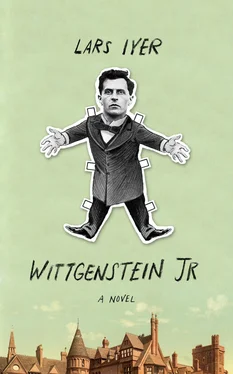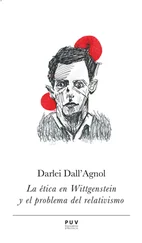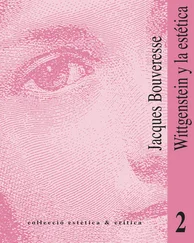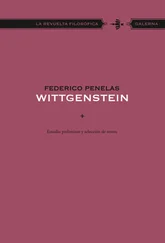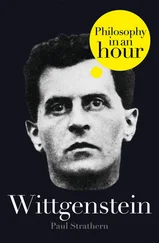In the shadowless summer, he’d live in innocence, his brother said. In lightness. In grace. And his soul would be as transparent as the wings of summer insects. And he would think as birds flit from branch to branch. As fish nuzzle the surface of the water. The thought of life would be indistinguishable from life. Thought would live. Life would think …
When his brother returned from Norway, Wittgenstein went to meet him at the airport, he says. He saw his brother, as he walked through arrivals, his rucksack on his back. His brother was thinner. There was more grey in his hair. Ice-flecks. And there was more depth in his eyes. A touch of horror , though his eyes were still kind and bright.
That night, over dinner, his brother spoke of the black depths of the fjord, and of the mountains which come all the way down to the water’s edge. He spoke of wooden houses and forests of conifer. He spoke of the dim light of autumn afternoons; of days fading, having never really begun; and of the frozen suspense of winter — of the sparkle of hoar-frost and of thick banks of snow.
To be in Norway was to be back at the beginning of the world, his brother said. The great ice-hewn rocks were as though left over from the creation. The pack ice in the fjord was like chunks of light. The mountain rivers were as pure as ice …
His brother spoke of Norwegian tears , frozen on his cheeks. He spoke of Norwegian laughter , bursting out in the crystalline air. He spoke of Norwegian joy , rising like sap in the conifers.
He’d feared only the Norwegian storms , his brother said. When the sky seemed to be tearing itself apart. To be tearing him apart. The storms of Norway: he’d have wished them on no one. They’d exhausted him. He’d lost days of work. How many times had he taken to his bed like an invalid, ringing down to the village for supplies?
But there was joy in recovering his strength after these storms, his brother said. There was joy in convalescing, as after a terrible illness. As after a fit of madness. In the silence of his cabin, he had felt his strength trickling back. Listening to the icicles drip-drip-drip, he had known himself to be coming to life again. And one day, he’d forced his water-swollen door open, and laughed as moisture clouded from his mouth.
There were Norwegian despairs , deeper and truer than his English despairs, his brother said. He’d feared their depths . But he’d been awed by them, too. His despairs had been as impersonal as the Norwegian landscape.
Oxford despair had always made him feel flat and sluggish, his brother said. Oxford turns you vague. Diffuse. Your soul dissipates in an Oxford despair. It dissolves as into a mist. But a Norwegian despair gathers you together, his brother said. Norwegian despair makes you coalesce. Consolidate. Norwegian despair places you— you —on trial. It summons you , just you, for judgement.
It’s as though the stars fling down their spears at you, his brother said. As though the stars burn in your flesh. Quite terrible! How alone you become! How cut-off! But how pure you become, too. There is no one around you. You are lonely. But it’s as though your loneliness is cauterised. As though your wounds glow with light. As though they are touched by frost-fire.
He’d dreamt of making a logical expedition to the northernmost reaches of Norway, across the ice field, his brother said. He’d dreamt of venturing forth, across the great glacier, striding over crevasses, with a notebook in his pocket. He’d dreamt of heading where no sane man would ever go.
He’d dreamt of making preparations for setting off. Of learning to breathe at high altitude. Of taking deeper and deeper breaths. Of acclimatising himself to the far north and to the farther north.
And he’d dreamt of heading forth one crisp, clear morning. Of setting off, before anyone had woken, as dawn broke. Of climbing up and up and up, following the course of the river to the foot of the glacier, and then climbing onto the ice. And then walking forth across the ice, up and only up, the sunlight dazzling his eyes.
He’d dreamt of the cairn left to commemorate his ascent. Of the legends that would remain of his disappearance. And he’d dreamt of his own dead body, somewhere high and far and sun-touched. He’d dreamt of his frozen body, there above the clouds, there in the element of truth. There, where the winter sun blazed. There, where everything was frost-fire sharp and ice-clear.
And he’d dreamt of his frozen notebooks, full of truth, his brother said. He’d dreamt of his indecipherable writing, full of truth. He’d dreamt of the path he had trailed that none could follow. He’d dreamt that he had died of truth, of terrible truth. That truth had thrown its spear through him. That truth’s tears had frozen on his cheeks.
The highest idea. The loneliest idea. How clearly it shined, for those who could see it! How absolute, broken from everything, for those who knew where to look! An idea like a star, a white star, blazing coolly. An idea broken off and burning by itself, exulting in darkness by itself.
Would he have reached it, that star, with his death? Would death have been the way that sun reached to him and touched him? Would his death have been the touch of that sun, the touch of truth ?
• • •
Spring came, his brother said. The days grew longer. He hadn’t been able to sleep. It was too bright. The light was merciless.
He’d felt like the last philosopher. The only philosopher, living on until he could bring philosophy to an end. Endless consciousness … Endless vigilance … Awake, awake, awake until the end of time. Was that to have been his sentence, until he’d brought philosophy to rest?
He’d been awake as no one had been awake before him, his brother said. He’d been awake for everyone, for all the insomniacs whose heads burn like lanterns beneath the starry night.
The mind meditating on the mind. The brain thinking constantly of itself. Thinking about thinking. Thinking about thinking about thinking. When would it stop? his brother had asked himself.
His brother had sought calm, Wittgenstein says. He’d sought order. He’d sought to stand like God over the elements, before the creation. Let there be order , he’d wanted to say. Let there be goodness .
His brother had sought, in his logic, to create a sanctuary on the face of the abyss. His brother had sought to uphold all particularities and inherent distinctions. He’d sought to safeguard the measure of the Creation, the divine Word that keeps everything in its place.
His brother had sought to hold back the waters of the Deep and the monsters of the Deep. He’d sought to preserve the structure of speech. He’d sought to renew the grammar of language, to strengthen its syntax. To keep hold of the names of things, along with the relations between them.
But logic wouldn’t obey his brother. Chaos came. The paths were drowned. The Creation was breached. A sea of evil flooded the world. And the fixed order of things was swept away …
Unformed thoughts; void thoughts: that’s what Wittgenstein’s brother wrote about in his final notebook. He wrote of storms of meaninglessness; of pure, brute being. Of regions in which even the law of non-contradiction fails, in which nothing is identifiable. In which the non-Word devours the Word …
His brother wrote of nothingness in his final notebook. Of nihilism adrift, spreading everywhere. He wrote of meaninglessness alive. Of the eleven dimensions of the void unfolding … He wrote of collapse —inward and outward. He wrote of hollowness . Of implosion . Of the erosion of the soul.
Читать дальше
